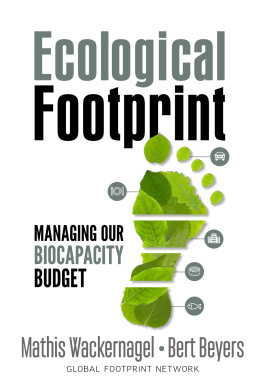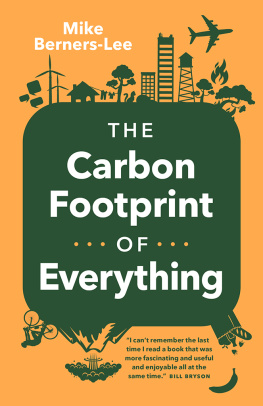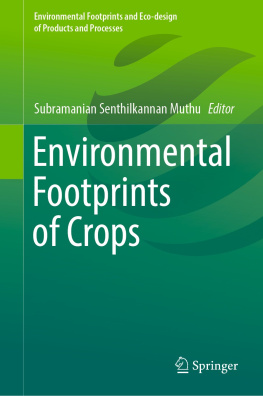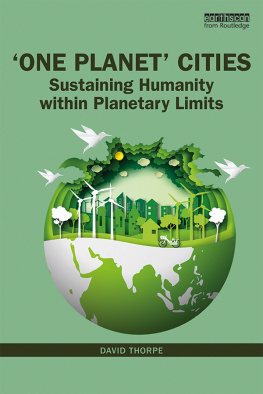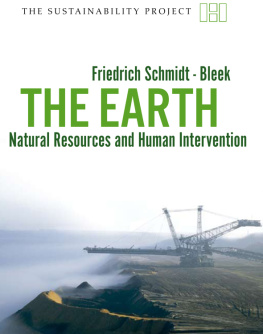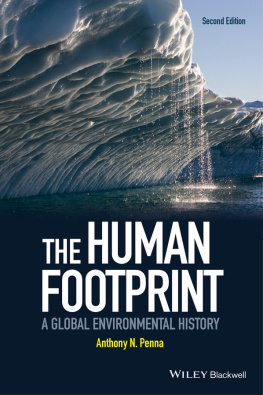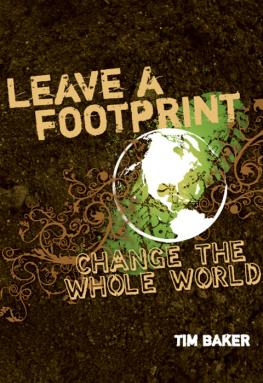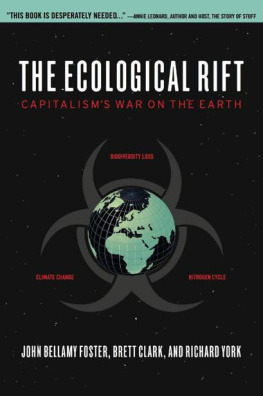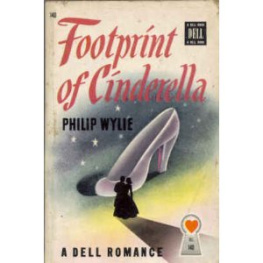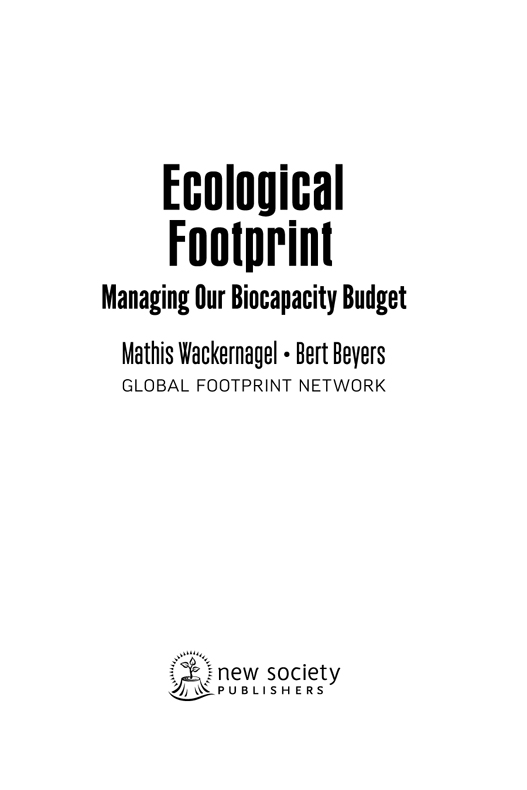Praise for Ecological Footprint
How much of the Earths biocapacity are humans using? Before the Ecological Footprint, no one knew for sure. Now, we have the equivalent of an instrument panel. This is a momentous development, and one that all citizens of the planet should know about because the warning lights are flashing red.
Richard Heinberg, Senior Fellow, Post Carbon Institute,
author of The End of Growth and Peak Everything
This excellent book helps us understand and truly appreciate Natures capacity to continue to provide life support for our planet and for all of its inhabitants.
Julia Marton-Lefvre, Former Director General,
International Union of Conservation of Nature
The great challenge for humanity in the 21st century is not to stop the growth of the economy, but to stop the growth in the human ecological footprint and eventually bring it back to one planet. This important book by the inventors of the concept explains why and how.
Prof. Jorgen Randers, former President of the BI Norwegian
Business School, coauthor of The Limits to Growth,
author of 2052 A Global Forecast for the Next Forty Years
If we did to our bank account what we have been doing to the Earths natural capital we would have been bankrupt long ago. The planet has been extremely lenient with us but that resilience is about to give way to a natural and human crisis. This book is a loud wake up call to everyone.
Christiana Figueres, former Executive Secretary, UNFCCC
In the nick of time, as humanity crashes up against the resource limitations of our collective twenty first century lifestyles, Ecological Footprint provides a clear eyed and accessible analysis of the challenge. With clarity and compassion, Ecological Footprint reveals both our alarming self-inflicted situation and the way forward. Wackernagel and Beyers well written book has the power to turn the tide.
Thomas E. Lovejoy, Professor of Environmental Science and Policy,
Institute for a Sustainable Earth George Mason University
A superb treatment of Ecological Footprint accounting as a part of our global balance sheet. Regardless of whether you are a student, a teacher, or an economist, you will find much of substantial importance in this book.
Peter H. Raven, President Emeritus, Missouri Botanical Garden, St. Louis
Looking for a science based practical tool to navigate your future on Earth? Here it is. Ecological Footprint provides an integrated and concrete measure of our human pressure on the Planet. We all urgently need to reconnect our lives to planet Earth and adopt a biocapacity approach to modern life, translating it into concrete steps of how each and every one of us can contribute to building resilient and sustainable societies.
Prof. Johan Rockstrm, Director of the
Potsdam Institute for Climate Impact Research
Human societies live and die by cultural myths including the catastrophic modern myth of perpetual economic growth. With their update of the Ecological Footprint, Wackernagel and Beyers wield the most effective myth-busting tool available. Failure to read this book should disqualify any would-be elected official from running for office.
William Rees is a human ecologist, ecological economist
and former Director of UBCs School of Community
and Regional Planning in Vancouver. He co-developed
the ecological footprint with Mathis Wackernagel
At a time when we must find ways to urgently respond to the existential threats of climate change and ecosystems extinction, this book systematically lays before us the accounting metric necessary to evaluate a world in overshoot. Almost 50 years ago two of the Limits to Growth scenarios predicted global system overshoot and collapse by the mid- to latter-part of the 21st century. Today ecological footprinting, if adopted by governments and business leaders, alongside comparable planetary solutions, could help navigate our emergence from emergency.
Sandrine Dixson-Declve, Co-President, The Club of Rome
Copyright 2019 by Mathis Wackernagel and Bert Beyers.
All rights reserved.
Cover design by Diane McIntosh.
Cover photo (leaves) and illustration (footprint): iStock
Initial English Translation by Katharina Rout.
Interior illustrations by Phil Testemale.
Printed in Canada. First printing September 2019.
Inquiries regarding requests to reprint all or part of Ecological Footprint should be addressed to New Society Publishers at the address below. To order directly from the publishers, please call toll-free (North America) 1-800-567-6772, or order online at www.newsociety.com
Any other inquiries can be directed by mail to:
New Society Publishers
P.O. Box 189, Gabriola Island, BC V0R 1X0, Canada
(250) 247-9737
LIBRARY AND ARCHIVES CANADA CATALOGUING IN PUBLICATION
Title: Ecological footprint : managing our biocapacity budget / by Mathis Wackernagel and Bert Beyers.
Other titles: Footprint. English
Names: Wackernagel, Mathis, 1962 author. | Beyers, Bert, author. | Rout, Katharina, translator.
Description: Translation of: Footprint: Die Welt neu vermessen. | Translated by Katharina Rout. | Includes bibliographical references and index.
Identifiers: Canadiana (print) 20190099534 | Canadiana (ebook) 20190099542 | ISBN 9780865719118 (softcover) | ISBN 9781550927047 (PDF) | ISBN 9781771423007 (EPUB)
Subjects: LCSH: Environmental economics. | LCSH: Economic developmentEnvironmental aspects. | LCSH: Human ecology. | LCSH: NatureEffect of human beings on. | LCSH: Environmental protection. | LCSH: Conservation of natural resources. | LCSH: Sustainability.
Classification: LCC HC79.E5 W3313 2019 | DDC 333.7DC23

New Society Publishers mission is to publish books that contribute in fundamental ways to building an ecologically sustainable and just society, and to do so with the least possible impact on the environment, in a manner that models this vision.

Contents
Prelude
by Mathis Wackernagel
This book is not really about the Ecological Footprint. Rather it is about biocapacity our planets biological power to regenerate and reproduce plant matter. This primary productivity of nature is the source for all life, including human life.
Biocapacity is not an invention or a method, the same way gravity isnt. Both are a force of nature that we can observe and measure.
The importance of biocapacity is rising. Given climate change and resource constraints, biocapacity, or rather how we manage it, is increasingly determining humanitys future. Humanitys poor stewardship of biocapacity has made it the materially most limiting factor for the human enterprise. Understanding biocapacitys relevance therefore empowers us to build countries, cities, or economies that can thrive for good, rather than being marred by surprises.
This is why I dedicate this book to the foresters, farmers, conservationists, park rangers, and fishery managers of the world, and in particular Fritz Jenni, an astute farmer from Langenbruck, Switzerland, who generously took me under his wings from my early boyhood to my teenage years, and taught me about natures cycles, miracles, and powers. Fritz Jennis love for the land and its animals, especially all people, continues to inspire me. He helped me see how biocapacity is the ultimate force enabling everything we do. Thank you, Fritz!
Next page
